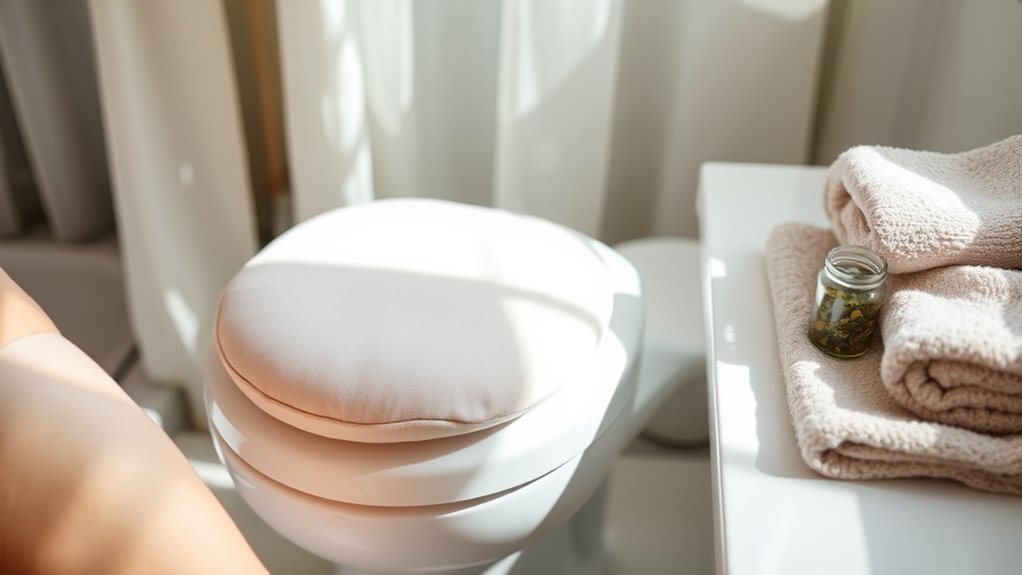Imagine traversing a rocky path after giving birth, where postpartum hemorrhoids can feel like unexpected bumps along the way. Many new mothers experience this discomfort due to the physical strain of labor and hormonal changes. It’s essential to understand what’s happening in your body and how you can find relief. In the following sections, you’ll discover effective strategies to manage these symptoms and regain your comfort.
What Causes Postpartum Hemorrhoids?
Postpartum hemorrhoids often arise due to the significant pressure placed on your pelvic veins during pregnancy.
As your uterus grows, it slows blood return from your lower body, leading to swollen veins in the rectum and anus. Hormonal changes during pregnancy also relax vein walls, making them more vulnerable to swelling and inflammation. This combination increases the likelihood of developing hemorrhoids.
Additionally, the physical strain from labor and delivery, including prolonged pushing, can exacerbate the pressure on the veins, resulting in hemorrhoids shortly after childbirth.
The physical strain of labor, especially prolonged pushing, can increase vein pressure and lead to postpartum hemorrhoids.
It’s important to note that this condition is quite common; approximately 43% of women experience hemorrhoids during the third trimester or within a month postpartum, emphasizing that you’re not alone in this experience.
Symptoms of Postpartum Hemorrhoids
After childbirth, you may notice several uncomfortable symptoms that indicate the presence of hemorrhoids.
One of the most common signs is pain during bowel movements, which can make this essential function distressing. You might also experience itchiness in the anal area, often due to swollen veins.
Bright red bleeding can occur, typically visible on toilet paper or in the toilet bowl, signaling a potential issue. If you feel sensitive lumps or bulges near your anus, these may be external hemorrhoids; however, internal hemorrhoids are often not visible.
It’s crucial to recognize that these symptoms can develop during the final weeks of pregnancy or within days after childbirth, affecting up to 43% of postpartum women.
Effective Treatments for Postpartum Hemorrhoids
Managing postpartum hemorrhoids can be challenging, but effective treatments are available to alleviate your discomfort.
Over-the-counter treatments, like topical creams containing hydrocortisone or witch hazel, can reduce inflammation and itching. You’ll find relief through warm sitz baths, which you should take for 15-20 minutes, two to three times daily, to help shrink swollen hemorrhoids.
Adopting a high-fiber diet with fruits, vegetables, and whole grains is essential for softening stools and easing bowel movements, ultimately helping to prevent constipation. Staying well-hydrated by drinking at least eight cups of water daily also supports healthy bowel movements.
If your symptoms persist or worsen, consult your healthcare provider to discuss prescription medications or potential surgical options for chronic cases.
Lifestyle Modifications for Relief

While steering through the challenges of hemorrhoids, making specific lifestyle modifications can greatly ease your discomfort.
Start by incorporating a high-fiber diet rich in fruits, vegetables, legumes, and whole grains to soften your stools, reducing straining during bowel movements and alleviating hemorrhoid symptoms.
Staying hydrated is essential, so aim for at least eight cups of water daily, especially if you’re breastfeeding.
Engage in light physical activity, like short walks, to improve circulation and digestive health, helping prevent constipation.
Avoid prolonged sitting or standing to minimize pelvic pressure; consider using a cushion for added comfort.
Finally, practice good toilet habits by elevating your feet with a footstool, which promotes proper bowel positioning and reduces straining.
When to Seek Medical Attention
Even with lifestyle modifications in place, certain symptoms indicate it’s time to seek medical attention.
If you experience excessive bleeding during bowel movements—soaking a pad or toilet paper every hour for two consecutive hours—you should act quickly.
Persistent or severe pain in the anal area that disrupts your daily activities also warrants evaluation.
Persistent or severe anal pain disrupting daily activities should always be evaluated by a healthcare professional.
Changes in bowel habits, like constipation lasting more than a few days or diarrhea, should prompt a consultation with your healthcare provider.
Be alert for signs of infection, such as fever, increased swelling, or pus discharge from the anal area, as these require immediate attention.
If hemorrhoid symptoms persist beyond a few weeks, follow-up appointments are essential to rule out more serious conditions.
Frequently Asked Questions
How to Get Postpartum Hemorrhoids to Go Away?
To help your postpartum hemorrhoids go away, increase fiber intake, stay hydrated, and take warm sitz baths. Consider over-the-counter creams for relief and engage in light exercise to promote regular bowel movements.
How Long Will Postpartum Hemorrhoids Last?
Postpartum hemorrhoids usually last a few days to weeks as your body heals. If symptoms persist beyond 8 to 12 weeks, it’s essential to consult a healthcare provider for evaluation and possible treatment options.
Conclusion
To summarize, postpartum hemorrhoids can be a painful predicament, but proactive practices can provide profound relief. By prioritizing proper treatments, promoting a fiber-filled diet, and participating in gentle physical activities, you can pave the way for healing. Remember, you’re not alone in this journey; seeking support and advice from healthcare professionals can guide you toward greater comfort. Embrace these steps, and reclaim your well-being with confidence and care.
